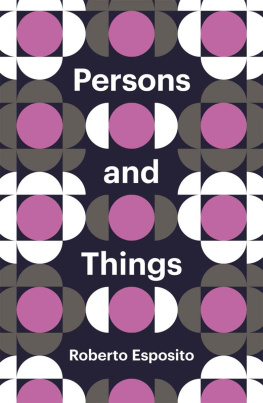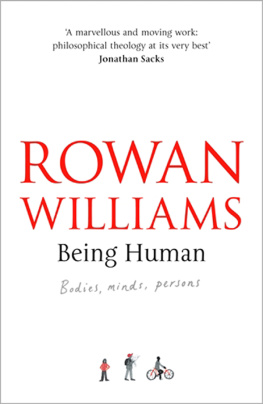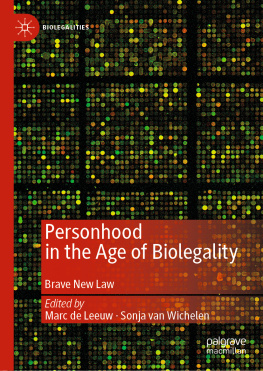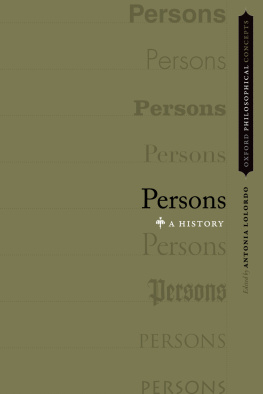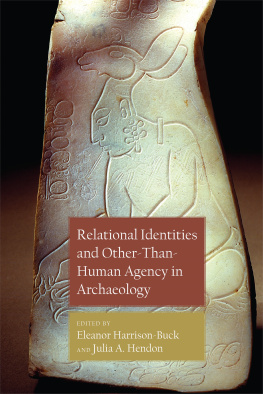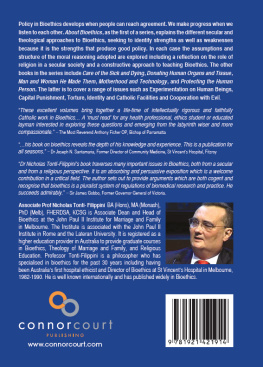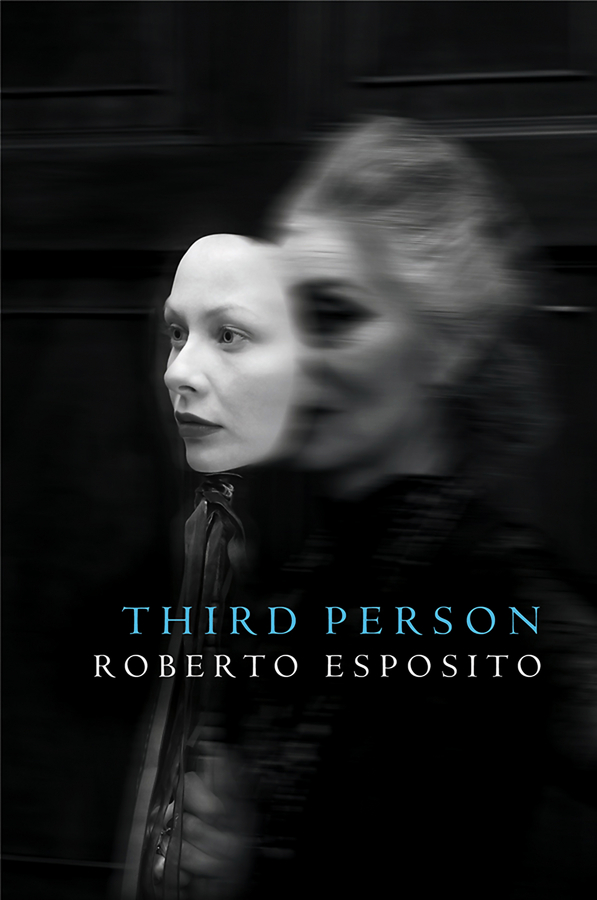
Table of Contents
Guide
Pages
Third Person
Politics of life and philosophy of the impersonal
Roberto Esposito
Translated by Zakiya Hanafi
First published in Italian as Terza Persona Giulio Einaudi s.p.a, 2007
This English edition Polity Press, 2012
Polity Press
65 Bridge Street
Cambridge CB2 1UR, UK
Polity Press
350 Main Street
Malden, MA 02148, USA
All rights reserved. Except for the quotation of short passages for the purpose of criticism and review, no part of this publication may be reproduced, stored in a retrieval system, or transmitted, in any form or by any means, electronic, mechanical, photocopying, recording or otherwise, without the prior permission of the publisher.
ISBN-13: 978-0-7456-4397-7
ISBN-13: 978-0-7456-4398-4(pb)
A catalogue record for this book is available from the British Library.
Typeset in 11 on 13 pt Sabon
by Toppan Best-set Premedia Limited
Printed and bound in Great Britain by MPG Books Group Limited, Bodmin, Cornwall
The publisher has used its best endeavours to ensure that the URLs for external websites referred to in this book are correct and active at the time of going to press. However, the publisher has no responsibility for the websites and can make no guarantee that a site will remain live or that the content is or will remain appropriate.
Every effort has been made to trace all copyright holders, but if any have been inadvertently overlooked the publisher will be pleased to include any necessary credits in any subsequent reprint or edition.
For further information on Polity, visit our website: www.politybooks.com
The translation of this work has been funded by SEPS
SEGRETARIATO EUROPEO PER LE PUBBLICAZIONI SCIENTIFICHE

Via Val dAposa 7 40123 Bologna Italy
Introduction
1
If there is an unquestioned assumption in contemporary debate, it involves the value universally awarded to the category of person. No matter what the discipline philosophy, theology, or one of the more specialized fields, like law or bioethics personhood remains the basis for legitimizing every theoretically correct discourse. This is not some well-reasoned conceptual choice. It is a given, one that apparently requires no further proof. Regardless of the starting perspective, it is hardly even conceivable today to take a critical look at what Maria Zambrano defined, back in the 1950s, as the part of human life that is most alive, the living core capable of passing through biological death. spanning both analytic and continental philosophy as well as Catholic and secular schools of thought.
This convergence between Catholics and secularists one that has never been openly declared and is actually often denied, even though the effects of its meaning are clearly at work is easily recognizable in the often bitterly polemical debate that, for over twenty years, has regularly flared up on the slippery terrain of bioethics. The debate hinges on determining the exact moment when a living being or on defining what type of living being can be considered a person, but never on the decisive value that this attribution entails. Whether a life is declared to be personal from the act of conception, at a certain stage of embryonic development, or from the moment of birth, its entrance into the regime of personhood is what lends it unquestionable value. It hardly matters whether one becomes a person by divine decree, through natural means, all at once, or in a series of stages: what counts is the threshold beyond which something generically living takes on a significance that radically changes its legal status. Nowhere to my knowledge, not even in the midst of the most profound disagreement on what may or should be defined as a person (not to mention the equally problematic distinction between a potential and an actual person), is what we, by habit or choice, call person ever questioned much less its absolute onto-theological primacy. If a tacit point of tangency exists between the seemingly opposing conceptions of the Christian sacredness of life and the secular notion of its quality, it resides precisely in this assumed superiority of the personal over the impersonal: only a life that can provide the credentials of personhood can be considered sacred or qualitatively significant.
When we turn from the lexicon of philosophy or bioethics to the more defined lexicon of the law, not only do we find the same assumption, we also recognize its conceptual roots. These lie in the association, which the modern legal notion has made for some time now, between the category of person and the subject of law, tying them together in such a way as to make of the former a condition for conceiving of the latter and vice versa. In order to be able to assert what we call subjective rights to life, to well-being, to dignity we must first enter into the enclosed space of the person. Conversely, in a similar fashion, to be a person means to enjoy these rights in and of themselves. A recent formulation of this idea, picked up by a wide variety of writers, makes a claim for the vindication of the right of every human being to have rights, that is, to be a legal person, entitled to certain inalienable rights, regardless of the status of their political membership.
Turning to specialized jurists, this position is further articulated along two apparently divergent vectors of meaning, which nevertheless find common ground in their shared agreement regarding the strategic importance of the person. Because of its universal applicability, personhood is seen as the only semantic field that can possibly overlap the two spheres of law and humanity, separated as they are by the national ideology of citizenship. This means that a concept like that of human rights is only conceivable and viable through the lexicon of personhood. As far as Luigi Ferrajoli is concerned, this does not mean negating the specificity of other types of rights, such as public rights granted only to citizens or political rights reserved only to those among them who are capable of acting; rather it means including all rights within a larger circle, constituted by the fundamental rights attributed to all the human beings endowed with the status of person. As the dynamics of globalization are breaking up the confines of national borders, driving legal praxis into increasingly international venues, human rights are no longer extended to individuals because they are citizens, but rather, because they are persons. To sum up: in this case, too, the category of person appears to be the only one that can unite human beings and citizens, body and soul, law and life.
2
But is this really how things stand? A quick look at the world situation raises a number of doubts on this point: the growing number of deaths from hunger, war, and epidemics is an eloquent testimony to the ineffectiveness of what has come to be called human rights. If this phrase was intended to signal the inclusion of all human life within the protective space of the law, we are forced to admit that no right is less guaranteed today than the right to life. How can this be? Considering that the inviolability of the person has become the guiding light of all democratically inspired social theories, where does this widening divergence between the affirmation of the principle and its practical application originate? Was the category of the person not supposed to establish a definitive point of union between law and life, subjectivity and body, form and existence? Of course, one can always answer, as people often do, that the category has not been extended enough to produce the desired results, or that it has been only partially affirmed in terms of quantity, and only approximately in terms of quality. In spite of the idea of person being proclaimed, appealed to, and raised high on every banner, it has not taken firm root at the heart of interhuman relations.
Next page

